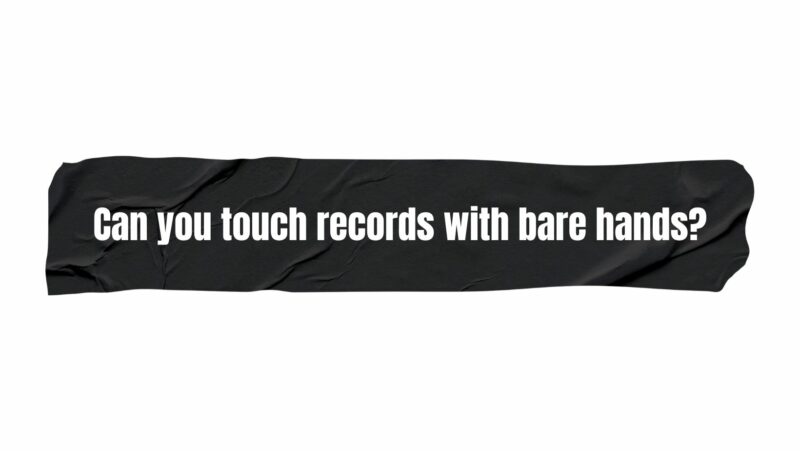Vinyl records are not just a medium for experiencing music; they are tangible artifacts that carry historical significance, artistic expression, and a sense of nostalgia. For enthusiasts and collectors, the question of whether you can touch records with bare hands is crucial, as it delves into the intricacies of preserving the quality, sound, and visual appeal of your vinyl collection. While vinyl records are more resilient than they may seem, proper handling is paramount to maintaining their integrity. In this article, we will explore the considerations surrounding touching records with bare hands, including the impact of oils, dirt, static electricity, handling techniques, protective measures, and the overarching goal of preserving these musical treasures.
The Impact of Oils and Dirt
Human hands naturally produce oils and residue, which can have a detrimental effect on the surface of vinyl records. When you touch a record with bare hands, the oils and debris from your fingers can transfer onto the vinyl’s surface. Over time, these substances can accumulate and lead to a range of issues:
- Sound Quality: Oils and debris on the record’s surface can affect the stylus’s contact with the grooves, resulting in compromised sound quality and distortion during playback.
- Dust and Particles: The oils from your fingers can attract and trap dust and particles, leading to a buildup of debris on the record’s surface. This buildup can affect the accuracy of the stylus’s tracking and potentially cause scratching.
- Surface Damage: Scratches and abrasions can occur more easily when the record’s surface is contaminated with oils and debris. These imperfections not only diminish sound quality but also impact the visual integrity of the vinyl.
Static Electricity Concerns
Aside from the oils and debris, static electricity is another consideration when touching vinyl records with bare hands. Vinyl records are susceptible to static charges, which can lead to the attraction of dust particles and potential damage to the record’s surface:
- Dust Attraction: Charged particles can cause dust and debris to cling to the record’s surface, exacerbating the issue of contamination and affecting sound quality.
- Stylus Damage: Static charges can cause the stylus to jump or skip across the grooves, potentially damaging the record and the stylus itself.
Proper Handling Techniques
While the idea of touching records with bare hands may seem daunting, there are proper handling techniques that can mitigate the risks associated with oils, dirt, and static electricity:
- Touch the Outer Edge: When handling a vinyl record, always touch it by the outer edge or along the label area. This minimizes the contact between your fingers and the playing surface.
- Hold the Record Vertically: Holding the record vertically while handling reduces the chances of oils transferring to the grooves. This technique also helps prevent accidental bending or warping of the record.
- Use Finger Pads: If you must touch the playing surface, consider using the pads of your fingers rather than the fingertips. The pads have fewer oil glands and are less likely to transfer oils.
Protective Measures
While it’s ideal to minimize direct contact with the record’s surface, there are additional protective measures you can adopt:
- Use Inner Sleeves: Even if you touch a record with clean hands, using inner sleeves provides an additional layer of protection against oils, debris, and static charges.
- Wash Your Hands: If you need to handle a record with bare hands, wash your hands thoroughly and dry them completely to minimize the transfer of oils.
- Anti-Static Brush: Use an anti-static brush before and after playback to remove dust and reduce static charges that may have accumulated.
The Preservation Goal
Ultimately, the goal of considering whether you can touch records with bare hands is to preserve the quality, sound, and visual appeal of your vinyl collection. Vinyl records are not only vessels for music but also artifacts that carry historical and cultural significance. By adopting proper handling techniques and protective measures, you ensure that your records remain in optimal condition for years to come:
- Sound Quality: Proper handling prevents contamination that can compromise the sound quality and fidelity of your vinyl records.
- Visual Appeal: By minimizing the transfer of oils and debris, you preserve the visual integrity of the vinyl’s surface and album covers.
- Longevity: Through careful handling, you extend the lifespan of your records, allowing you and future generations to enjoy their musical magic.
Conclusion
The question of whether you can touch records with bare hands underscores the importance of mindful and respectful handling practices. While vinyl records are relatively resilient, the impact of oils, dirt, and static electricity can lead to issues that affect sound quality, visual appeal, and overall longevity. By adopting proper handling techniques, using inner sleeves, and taking protective measures, you contribute to the preservation of your vinyl collection’s historical and artistic value.
When you handle a vinyl record, you’re not just interacting with music; you’re engaging with a piece of cultural history, a vessel of artistic expression, and a conduit to the past. By treating your vinyl records with care and consideration, you ensure that they continue to tell their musical stories for generations to come.


